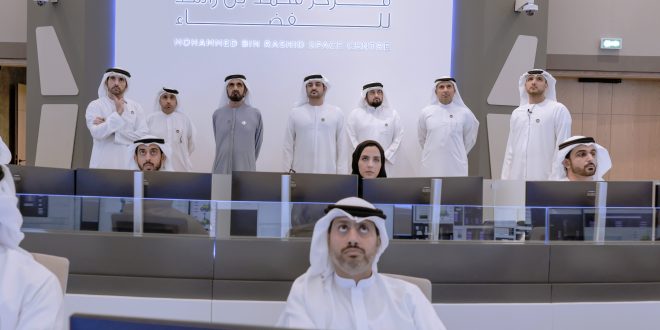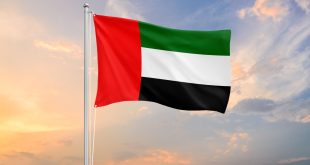The United Arab Emirates launched its latest space mission, Rashid Rover, as part of the Emirates Lunar Mission, representing a pioneering national endeavour in the space sector and a historic moment that, if successful, will be the first Emirati and Arab mission to land on the surface of the Moon.
His Highness Sheikh Mohammed bin Rashid Al Maktoum, Vice President, Prime Minister and Ruler of Dubai, emphasised that the UAE’s space ambitions continue to be realised by achieving high levels of accomplishment and empowering space cadres to develop the national space sector and consolidate the country’s advanced position in space.
While witnessing the launch of the Rashid Rover from the Mohammed Bin Rashid Space Centre’s (MBRSC) Mission Control Centre, Sheikh Mohammed commented, “A new stopover for our nation… A new stopover for our cadres and the youth… A new stopover leading to our journey to explore the Moon.
“Rashid Rover is part of the UAE’s ambitious space programme, which began with Mars, progressed to the Moon, and soon to Venus. Our goal is to increase our knowledge, enhance our capabilities, and leave a scientific legacy in the history of space and humanity.
“Reaching the Moon is a milestone in our ambitious march to progress for our nation and its people, who know no limits. And our next step is bigger and higher.”
Accompanying His Highness Sheikh Mohammed at the MBRSC’s Mission Control Centre were H.H. Sheikh Hamdan bin Mohammed bin Rashid Al Maktoum, Crown Prince of Dubai and Chairman of Dubai Executive Council; H.H. Sheikh Maktoum bin Mohammed bin Rashid Al Maktoum, Deputy Ruler of Dubai, and Deputy Prime Minister and Minister of Finance; H.H. Sheikh Ahmed bin Mohammed bin Rashid Al Maktoum, Chairman of the Dubai Media Council; Mohammad bin Abdullah Al Gergawi, Minister of Cabinet Affairs; Talal Humaid Belhoul Al Falasi, Vice President of the MBRSC; and Hamad Obaid Al Mansoori, Chairman of the Board of Directors of the MBRSC.
Rashid Rover will now cruise through space for nearly four months, aiming to land in the Moon’s Atlas Crater in April 2023.
The Emirates Lunar Mission is part of the new 2021-2031 strategy launched by the MBRSC, which includes the development and launch of Rashid, the first Emirati lunar rover named after the late Sheikh Rashid bin Saeed Al Maktoum, builder of modern Dubai.
Being referred to as one of the world’s most compact rovers, the Rashid Rover was designed and developed by Emirati engineers from the Mohammed Bin Rashid Space Centre team. It aims to pave the way for humanity to make even more qualitative advances in science, technology, communication, and robotics while enabling us to prepare for future missions to the Moon and beyond.
Emirates Lunar Mission, a scientific exploration mission
The Mohammed Bin Rashid Space Centre has identified a set of scientific goals for the Rashid Rover. The ambitious mission undertaken by the UAE will study the lunar surface and uncover insights that will catalyse technology development and the future of space exploration. The mission will study different aspects of the lunar surface, including lunar soil, thermal properties of surface structures, and the lunar photoelectron sheath.
The Emirati lunar rover will land on an area of the Moon’s surface that previous lunar exploration missions have not explored. Therefore, it will provide novel and highly valued data, images, and insights. During its mission, the lunar rover will collect scientific data on matters relating to the origin of the solar system, our planet and life.
Successfully lifted off on 11th December at 11:38 GST from Space Launch Complex 40 (SLC-40) at Cape Canaveral Space Force, Florida, the Rashid Rover was integrated into iSpace M1 lander that was loaded atop the SpaceX Falcon 9 rocket.
The mission will go through seven major milestones: Launch and Early Orbit, Cruise Phase, Landing phase, Deployment, Commissioning and Drive Off phase and Nominal Surface Operations. The mission will conclude with the last two phases of Hibernation and the Last Decommissioning phase.
Once the lander reaches the surface, the unexplored areas of Atlas Crater safely, the rover will spend one lunar day — nearly 10 to 12 Earth days — exploring the properties of lunar soil, the petrography and geology of the Moon, dust movement, and study surface plasma conditions and the Moon’s photoelectron sheath.
Following the Hope Probe to Mars, the world had been waiting for the UAE’s next ambitious space mission.
After the launch, Hamad Obaid Al Mansoori, Chairman of MBRSC, said, “With the Emirates Lunar Mission’s successful launch, the UAE space industry is entering a new era and is on course to go down in the history of lunar missions. The ELM embodies the spirit of the UAE’s innovation and scientific progress in accordance with the vision of its wise leadership, which encourages scientific ambition and achievement. And as it followed the 51st UAE National Day, there was no better way to honour this momentous national accomplishment.”
Commenting on the launch, Salem Al Marri, Director-General of MBRSC, said, “We have made history with the launch, and what an incredible sight to watch the first Emirati mission to the Moon take off. It’s taken a lot to get here, and I congratulate everyone who was behind the mission. We now look forward to the landing on the Moon’s surface and completing the Emirates Lunar Mission, which will contribute to future explorations and beyond.”
Rashid Rover’s design and features
Rashid Rover will be one of the world’s most compact rovers to traverse and explore the Moon’s surface with a unique configuration.
As for the technical configuration of Rashid Rover, it will work based on solar panels, which are mounted at a certain angle to maximise the collection of solar energy. It will carry four cameras, including two main cameras, a microscopic and a thermal imaging camera, in addition to sensors and systems equipped to characterise the soil, dust, radioactive and electrical activities, and rocks on the Moon’s surface. The rover will perform numerous scientific experiments to measure the effectiveness of some materials on the lunar surface, such as the efficiency of adhesion of the rover wheels to the lunar surface, and to facilitate the process of overcoming natural challenges.
Supporting the communication system, Rashid Rover has two in-built communication channels. The primary communications channel allows high-speed bandwidth that transfers information from the rover through the lander and then to the ground station. The secondary communication channel is used for direct communication between the Rashid Rover and the ground station at the Mohammed Bin Rashid Space Centre. The secondary channel will be activated in the event of a malfunction in the main communication channel and during the lunar night recovery phase.
This ambitious mission undertaken by the UAE to study the surface of the Moon is considered a gateway for future exploration of other planets, especially for Mars under the Mars 2117 programme.
 UAE BARQ برق الإمارات – نبضك
UAE BARQ برق الإمارات – نبضك


